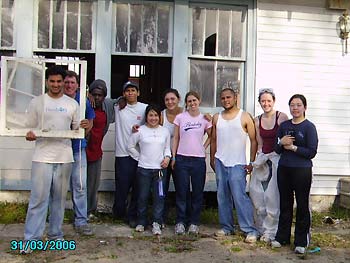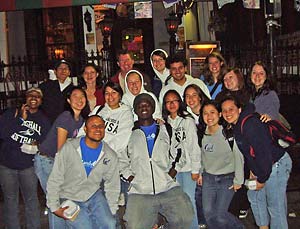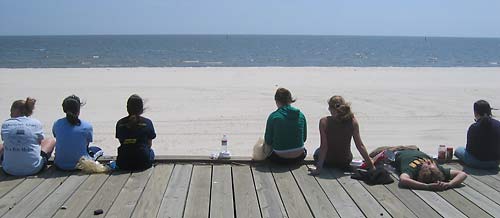UC Berkeley Web Feature
Spring break in Biloxi
Building a family while helping other families persevere
 This is the third and last in a series of dispatches from Judy Wang (left), a UC Berkeley third-year double major in molecular and cell biology and psychology. She spent her spring break in Mississippi, helping with Hurricane Katrina relief efforts as part of the campus's Alternative Breaks program.
This is the third and last in a series of dispatches from Judy Wang (left), a UC Berkeley third-year double major in molecular and cell biology and psychology. She spent her spring break in Mississippi, helping with Hurricane Katrina relief efforts as part of the campus's Alternative Breaks program.
By Judy Wang | Saturday, April 1, 2006
Day 8
BERKELEY — We're back in Berkeley after nearly an entire day of flying, with loads of dirty laundry and countless stories of an unforgettable week, unforgettable people and images that will forever be imprinted on our minds and hearts.
 On their last day of work in Biloxi, a mold crew from Berkeley gathers outside the house they were cleaning. (Lydia Pollard photo) |
We started out as 22 strangers, from all walks of life. In one week, the people of the Gulf Coast changed us into a family that laughed and cried together, and lived and breathed the same purpose — to bring service to those who needed it the most.
Friday was our last day in Biloxi, and we spent it doing what we had done all week—interiors and mold. My interiors group was sent to a house on Holley Street in East Biloxi to keep gutting a house that, according to the homeowner, was 150 years old. She had bought it with her husband in 1960 for $7,000 when they moved to the area. The live oak tree in her front yard, which is still standing after Katrina, is more than 500 years old. Sitting on her porch with a light breeze coming from the shore, she told us stories about her years as a school teacher, about times when orchard trees were in place of houses and about how, like everyone else, her life has changed as a result of Katrina.
She talked about the months that she spent at a women's shelter shortly after Katrina devastated the region. Due to the lack of privacy the shelter offered, she moved back into the upper story of her house, even though the house had yet to be worked on. That day, she "paid" us for our work with more than 20 bananas and apologized for the bananas being too ripe. Bananas or no bananas, it made no difference to us. It was just one of many examples of Southern hospitality we were exposed to over the week.
Our group also forged bonds with the long-term volunteers at Hands On USA and developed an indescribable admiration for the work that they have committed themselves to. These people include those who chose to come here on their own merit by buying one-way plane tickets to the Gulf and those in Americorps' National Civilian Conservation Corps division.
 After a week of hard work in Biloxi, the entire Berkeley contingent spent a night unwinding on New Orleans' famous Bourbon Street. (Lydia Pollard photo) |
The media has moved on from coverage of the region, and as a result, America has left the Katrina victims behind. People talk about how New Orleans is back, because the media has only shown the Mardi Gras party, and the lively French Quarter nightlife, which we were fortunate to experience. The jazz musicians and street vendors are back out on the street, with countless FEMA and Katrina jokes. However, when we drove out of downtown, it was evident that much work still needs to be done, and as one of the Tulane University students that spoke at the panel we went to last week mentioned, no one has yet taken accountability for the impact of the disaster.
Empty FEMA trailers sit in lots, waiting to be inhabited. The lucky families have been relocated out of the Gulf Coast, while many more families wait for housing and for someone to tell them why they must still wait. Businesses are closed while awaiting workers, but the paradox is that, without housing, there will be no workers, and without workers, New Orleans can't come back.
This experience was incredibly humbling. With the disaster behind the residents, and political wrangling ahead, we were surprised that many of them share a hopeful outlook for the future. The New Orleans student who spoke at Tulane, for example, had no doubt in his mind that people would start to come back, but he also cautioned that, of course, housing would need to be built first.
Before we left, one of the long-term volunteers spoke about her experience working with Hands On USA and mentioned this quote from the movie "Coach Carter": "Our deepest fear is not that we are inadequate. Our deepest fear is that we are powerful beyond measure."
I can't speak for the rest of my group but, for me, looking back, I had not quite prepared myself for the impact our group would have on the neighborhoods we worked in, and I can't say that I knew I would be able to physically do the work. Somehow, though, we all found the strength and the courage to put aside our fears and doubts to do our very best service and found that we were powerful beyond our own measure.
 Berkeley volunteers grab lunch — and a much-needed break — at the beach near the house they were cleaning out in Biloxi . (Judy Wang photo) |

